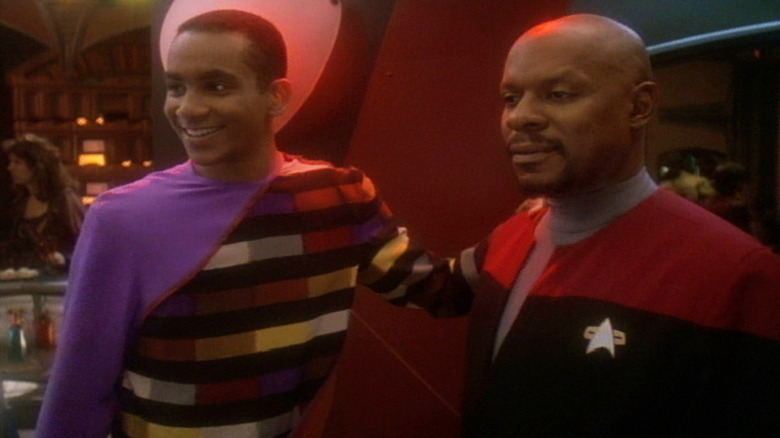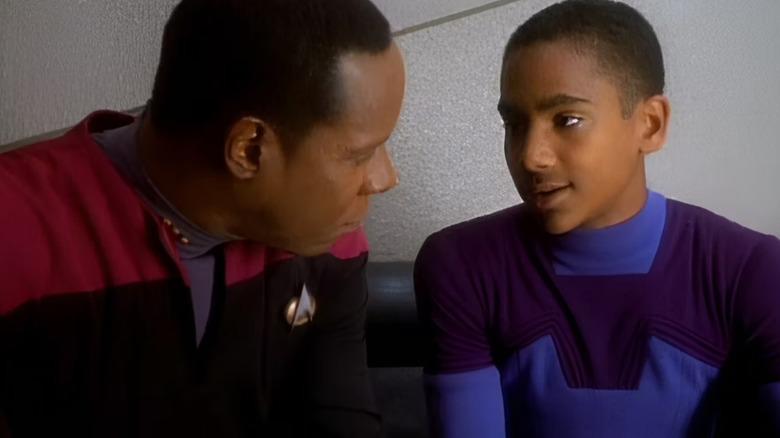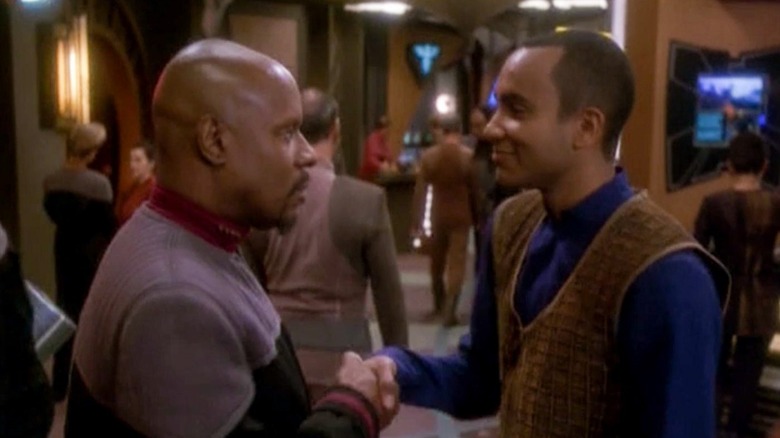How A '50s Western Series Laid The Groundwork For Star Trek: Deep Space Nine
"Star Trek: Deep Space Nine" isn't quite like any other "Star Trek" show, and when it debuted in 1993, it was quite the departure from both the original series and "Star Trek: The Next Generation." Instead of following intrepid explorers on starships trekking across the galaxy, "Deep Space Nine" followed the stories of the people who lived on board the space station Deep Space Nine (DS9) — civilians, Bajoran militia, and Starfleet officers alike. Showrunner Rick Berman was in charge of taking the "Star Trek" universe in a new direction following the success of "The Next Generation," but he ended up looking to a rather old television series for inspiration.
In an interview with StarTrek.com, Berman explained the inspiration behind "Star Trek: Deep Space Nine" and revealed that he and writer/producer Michael Piller got their biggest idea from a classic 1950s Western. That's pretty great given the fact that "Star Trek" creator Gene Roddenberry pitched the original series as the '50s Western series "'Wagon Train' in space," making at least two "Trek" shows directly derived from mid-century Westerns. While there might not seem like there's a lot of overlap between science-fiction and Westerns, they both have the frontier, lawless territories rife with danger, and the great unknown. The two "Star Trek" shows just dealt with those themes a little differently, in part because they were inspired by rather different shows.
Looking to The Rifleman
Berman explained that it was very important for him and his fellow creatives to do something different with "Deep Space Nine" because "The Next Generation" followed so closely in the footsteps of the original series and they knew they "didn't want to send another crew out on a spaceship at the same time the 'TNG' crew was out on the Enterprise." So when the head of the studio at the time, Brandon Tartikoff, suggested a series inspired by the Western "The Rifleman," it sparked something for Berman and Piller:
"It's a father and a son out doing good deeds on the prairie. This was an era when television executives loved to say, 'Let's do 'The Partridge Family' meets 'Father Knows Best.” Roddenberry evidently had talked about ”'Wagon Train' in space' 20 years before and 'DS9' was ”The Rifleman' in space.' I think what [Piller] and I ended up pulling from that was the idea of a father and a son, and we chose to do the story of a man who had recently lost his wife, who was very bitter, and was sent to a very distant space station that was not a Federation facility. As a result, we could have a lot of non-Starfleet people."
This idea led to arguably the greatest "Star Trek" series of them all and forced the crew into situations unlike those on any other show in the franchise. The station's captain, Benjamin Sisko (Avery Brooks), was forged in fire and became the best "Star Trek" captain as a result. Berman and Piller were also right on the money with their "father and son" concept because the relationship between Ben and his son Jake (Cirroc Lofton) is not only one of the best in all of "Star Trek," but all of television.
Father and son on the frontier
"The Rifleman" followed rancher Lucas McCain (Chuck Connors) and his son Mark (Johnny Crawford) as they tried to do right by the world even though things were rough on the frontier just after the Civil War. Like Lucas, Ben has only somewhat recently lost his wife as the result of war and sets out to try and do some good at the extremely distant outpost of DS9. The relationship between Ben and Jake is one of the strongest emotional cores in the series because they are so dynamic and real while also being incredibly inspirational. "Star Trek" has a somewhat rocky history when it comes to child characters on various shows, with some fans who really loathed Wil Wheaton's Wesley Crusher on "Star Trek: The Next Generation," but thankfully they course-corrected a bit with Jake. Sure, he's occasionally annoying and frustrating, but that's his job! He's a teenager!
Eventually Jake became a fully-fledged member of the cast who had major arcs and growth, experiencing the horrors of war both as the son of a pseudo-military commander and as a budding journalist. He also provided a much-needed counter to Starfleet propaganda and had some truly incredible episodes (including one where an older version of him was played by Tony Todd). Maybe one day we'll get a "Deep Space Nine" reunion the same as the one we got on season 3 of "Picard" and we can see what's become of Jake since his dad ascended to wormhole godhood in the series finale. A nerd can dream.


